One in five hospitality landlords still 'unwilling to negotiate' on rent
One in five hospitality landlords are still unwilling to negotiate on rent payments, UKHospitality chief executive Kate Nicholls told MPs.
The industry has accrued around £2.5b in rent debt since the start of the pandemic last year, with many businesses struggling to cover repayments.
Nicholls said the situation was improving but some 20% of operators have hit a “stalemate” with landlords.
She urged the government to provide a code of practice to guide rent negotiations after the ban on commercial evictions was extended until March 2022.
“We need detail… on the next steps to be able to give a further nudge to get those deals over the line,” Nicholls told the Business, Energy and Industrial Strategy Committee.
Only 10% of hospitality businesses were able to pay rent in full throughout the pandemic and 25% have been making partial payments, though Nicholls said this had been a struggle and led to many taking on more debt.
Around 49% have now reached an agreement with landlords, with some writing off debt or extending the time to pay, while 22% are in negotiations.
Threat of legal action
Nicholls said some landlords have used county court judgements, which are not blocked by the eviction moratorium, as a “threatening tool” to force operators to make payments.
These judgements are issued in England and Wales when people fail to repay money they owe. No enforcement action can be taken as a result, but they can damage the reputation and credit rating of a business, leaving some feeling they have no choice but to pay.
Earlier this year Caffe Concerto told The Caterer it was facing a county court ruling from one of its landlords, while Tampopo owner David Fox [told the BBC](www.bbc.co.uk/news/business-57481894) he had been threatened with a similar judgement.
“It’s a small proportion of cases but where they are used or where the threat was used it has a real impact,” said Nicholls.
She added that landlords needed to be aware many hospitality businesses were still not profitable while open and trading with restrictions.
“That is an area that it has been quite a challenge to make sure that landlords understand as we move forward, that open doesn’t mean viable and able to make a payment.”


















